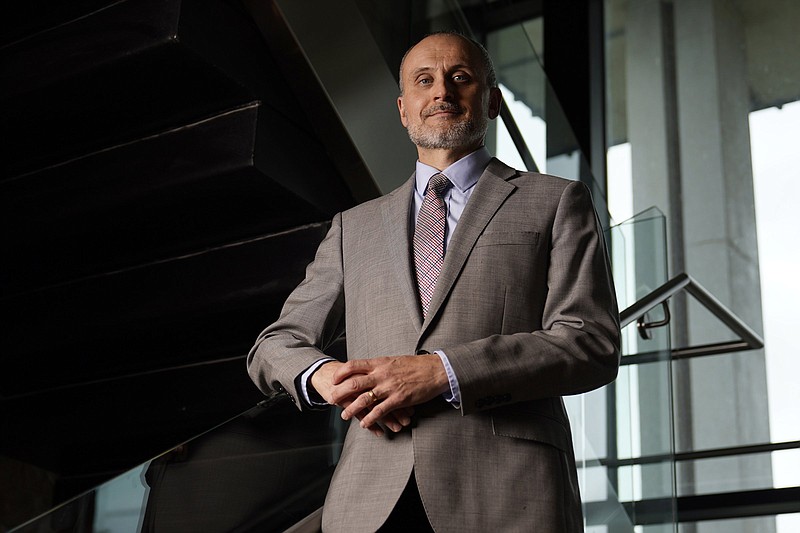WASHINGTON -- In the months since President Joe Biden warned Russia's Vladimir Putin that he needed to crack down on ransomware gangs in his country, there hasn't been an attack like the one last May that resulted in gasoline shortages. But that's small comfort to Ken Trzaska.
Trzaska is president of Lewis & Clark Community College, a small Illinois school that canceled classes for days after a ransomware attack last month that knocked critical computer systems offline.
"That first day," Trzaska said, "I think all of us were probably up 20-plus hours, just moving through the process, trying to get our arms around what happened."
Even if the United States isn't currently enduring large-scale, front-page ransomware attacks on par with ones earlier this year that targeted the global meat supply or kept millions of Americans from filling their gas tanks, the problem hasn't disappeared. In fact, the attack on Trzaska's college was part of a barrage of lower-profile episodes that have upended the businesses, governments, schools and hospitals that were hit.
The college's ordeal reflects the challenges the Biden administration faces in stamping out the threat -- and its uneven progress in doing so since ransomware became an urgent national security problem last spring.
U.S. officials have recaptured some ransom payments, cracked down on abuses of cryptocurrency and made some arrests. Spy agencies have launched attacks against ransomware groups and the U.S. has pushed federal, state and local governments, as well as private industries, to boost protections.
Yet, six months after Biden's admonitions to Russian President Vladimir Putin, it's hard to tell whether hackers have eased up because of U.S. pressure. Smaller-scale attacks continue, with ransomware criminals continuing to operate from Russia with seeming impunity.
Administration officials have given conflicting assessments about whether Russia's behavior has changed since last summer. Further complicating matters, ransomware is no longer at the top of the U.S.-Russia agenda, with Washington focused on dissuading Putin from invading Ukraine.
The White House said in a statement that it was determined to "fight all ransomware" through its various tools but that the government's response depends on the severity of the attack.
"There are some that are law enforcement matters and others that are high impact, disruptive ransomware activity posing a direct national security threat that require other measures," the White House statement said.
Ransomware attacks -- in which hackers lock up victims' data and demand exorbitant sums to return it -- surfaced as a national security emergency for the administration after a May attack on Colonial Pipeline, which supplies nearly half the fuel consumed on the East Coast.
Since then, there have been some notable attacks from groups believed to be based in Russia, including against Sinclair Broadcast Group and the National Rifle Association, but none of the same consequence or impact of those from last spring or summer.
One reason may be increased U.S. government scrutiny, or fear of it.
The Biden administration in September sanctioned a Russia-based virtual currency exchange that officials say helped ransomware gangs launder funds. Last month, the Justice Department unsealed charges against a suspected Ukrainian ransomware operator who was arrested in Poland, and has recovered millions of dollars in ransom payments.
U.S. officials have shared a small number of names of suspected ransomware operators with Russian officials, who have said they have started investigating, according to two people familiar with the matter who were not authorized to speak publicly.
It's unclear what Russia will do with those names, though Kremlin spokesman Dmitry Peskov insisted the countries have been having a useful dialogue and said "a working mechanism has been established and is actually functioning."
Even as the suspected ransomware hacker awaits extradition to the U.S. following his arrest in Poland, another who was indicted by federal prosecutors was later reported by a British tabloid to be living comfortably in Russia and driving luxury cars.
Some are skeptical about attributing any drop-off in high-profile attacks to U.S. efforts.
"It could have just been a fluke," said Dmitri Alperovitch, former chief technology officer of the cybersecurity firm Crowdstrike. He said asking Russia to crack down on large-scale attacks won't work because "it's way too granular of a request to calibrate criminal activity they don't even fully control."
Top American officials have given conflicting answers about ransomware trends since Biden's discussions with Putin. Some FBI and Justice Department officials say they've seen no change in Russian behavior. National Cyber Director Chris Inglis said there's been a discernible decrease in attacks but that it was too soon to say why.
Information for this article was contributed by Dasha Litvinova of The Associated Press.
